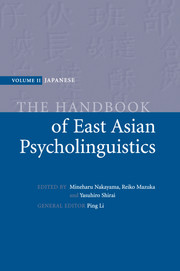Book contents
- Frontmatter
- Contents
- List of figures
- List of contributors
- In memory of Miwa Nishimura
- Preface
- Introduction
- Language acquisition
- Part II Language processing
- 26 The phonetic and phonological organization of speech in Japanese
- 27 Speech segmentation by Japanese listeners: its language-specificity and language-universality
- 28 Prosody in sentence processing
- 29 Speech errors
- 30 Effects of word properties on Japanese sentence processing
- 31 Orthographic processing
- 32 Lexical access
- 33 Incrementality in Japanese sentence processing
- 34 Processing alternative word orders in Japanese
- 35 Processing relative clauses in Japanese: coping with multiple ambiguities
- 36 Processing empty categories in Japanese
- 37 The difficulty of certain sentence constructions in comprehension
- 38 Reading and working memory
- 39 Sentence production in Japanese
- 40 The neural basis of syntactic processing in Japanese
- 41 The competition model
- 42 Connectionist models
- 43 Computational linguistics
- 44 Language and gesture as a single communicative system
- References
- Name index
- Subject index
32 - Lexical access
from Part II - Language processing
Published online by Cambridge University Press: 05 June 2012
- Frontmatter
- Contents
- List of figures
- List of contributors
- In memory of Miwa Nishimura
- Preface
- Introduction
- Language acquisition
- Part II Language processing
- 26 The phonetic and phonological organization of speech in Japanese
- 27 Speech segmentation by Japanese listeners: its language-specificity and language-universality
- 28 Prosody in sentence processing
- 29 Speech errors
- 30 Effects of word properties on Japanese sentence processing
- 31 Orthographic processing
- 32 Lexical access
- 33 Incrementality in Japanese sentence processing
- 34 Processing alternative word orders in Japanese
- 35 Processing relative clauses in Japanese: coping with multiple ambiguities
- 36 Processing empty categories in Japanese
- 37 The difficulty of certain sentence constructions in comprehension
- 38 Reading and working memory
- 39 Sentence production in Japanese
- 40 The neural basis of syntactic processing in Japanese
- 41 The competition model
- 42 Connectionist models
- 43 Computational linguistics
- 44 Language and gesture as a single communicative system
- References
- Name index
- Subject index
Summary
In this chapter, lexical access during reading will be discussed. Reading is the process of extracting pronunciation and meaning from print, and researchers (linguists, cognitive- and neuropsychologists, and more recently neuroscientists) have long been interested in these reading processes, particularly for English.
The direct-access hypothesis postulates that the lexical access of meaning results directly from orthography without recourse to phonological encoding (e.g. Smith, 1971), while the indirect access hypothesis assumes that transcoding from orthography to phonology is necessary before lexical access can occur (e.g. Gough, 1972; van Orden, 1987; van Orden, Pennington & Stone, 1990). Further, the dual encoding hypothesis postulates that lexical access can occur through either indirect phonological or direct orthographic codes (e.g. Coltheart et al., 2001; Rastle & Coltheart, 1999). The latter is also known as a dual-route reading model, and represents the most popular and influential theory of reading processing. The model has been developed on the basis of, and in order to explain, empirical data from both normal readers (e.g. Patterson & Coltheart, 1987), and neurological patients with acquired reading disorders (e.g. Coltheart, Patterson & Marshall, 1980; Patterson et al., 1985).
Dual-route versus single-route reading models in English
The dual-route models typically assume two distinct routes for reading: lexical (whole-word) and nonlexical (subword) routes. In the lexical route, orthographic, semantic, and phonological representations of words are functionally independent, and are stored in the orthographic (input) lexicon, semantic system, and phonological (output) lexicon respectively.
- Type
- Chapter
- Information
- The Handbook of East Asian Psycholinguistics , pp. 241 - 248Publisher: Cambridge University PressPrint publication year: 2006
- 1
- Cited by



